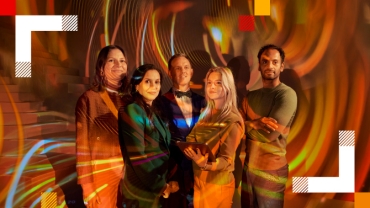
Happy Tosti
Happy Tosti started up five years ago as a lunchroom in The Hague. It’s now a chain of seven social lunchrooms where employees with and without an occupational disability serve toasted sandwiches. Like many businesses, Happy Tosti has been hit hard by the corona crisis. The branches are now only open for take-away lunches, and the opening of “De Broodbrouwers” – the new bistro/bakery – has had to be postponed. Even so, founders Jasper Kool and Wibe Smulders remain positive: “What’s really keeping us going is the positive energy we’ve felt from everybody.”

Jasper Kool (left) and Wibe Smulders - Happy Tosti
Social business model
An important component of Happy Tosti’s social business model is the obligation for all the restaurants to have at least 65 percent of all their hours worked by employees with an occupational disability. For them, temporary closure of the restaurants due to the corona crisis has had a big impact. Wibe Smulders explains: “People with an occupational disability have often been marginalised for a long time, but thanks to their job with us they’ve been able to participate in society once more. But now they’re just back home on the couch again, even though they’re still employed by us. This situation isn’t beneficial for this group, because exercising and having a daily rhythm, for example, are very important. Together with all our managers and job coaches, we are doing everything possible to create a bit of structure for them, for example by means of Skype meetings and repair and cleaning schedules. Our employees just need a bit of extra attention at the moment.”
Social and economic relevance
“Our people are the most important asset of our company”, Smulders continues, “because without them, in normal times, we can’t generate any turnover. When we started Happy Tosti, our basic principle was to provide an enjoyable, educational, paid job for as many people with a disability as possible. The fact that the job is enjoyable and educational ensures that they like going to work, gain experience, and stay with us for a lengthy period of time. The fact that we pay a fair salary makes us socially and economically relevant as a company. Our employees are often partially incapacitated for work and are receiving social assistance benefit. Paid employment with us means that benefits can be reduced.” Happy Tosti makes use of wage subsidy, but the company deliberately doesn’t focus on available care subsidies or the allowance for daytime activities of a work-related nature. Wibe Smulders: “As a company, we don’t want to be structurally dependent on subsidies.”
Bistro-bakery De Broodbrouwers
Due to the corona crisis all the Happy Tostis are now closed, although they are still trying to generate some turnover by selling take-away lunches. The opening of De Broodbrouwers [“The Bread Brewers”], the company’s new bistro/bakery in The Hague, has also had to be postponed. Wibe Smulders: “De Broodbrouwers is our biggest project yet, and it’s complete ready to go – the wine and beer glasses are there waiting to be filled. Postponing the opening means a big financial blow for us. We’ve put all our reserves into the project, and the corona crisis means that we don’t have the opportunity to build up new reserves. But we’re extremely grateful that the highly committed financiers with which we’re launching the project are right behind us one hundred percent.”

Positive energy
Happy Tosti is making use of a number of government schemes, such as the Temporary Emergency Bridging Measure for Employment [Tijdelijke Noodmaatregel Overbrugging voor Werkgelegenheid (NOW)]. Wibe Smulders explains: “These schemes are important for us of course, but what’s really keeping us going is the positive energy we’ve felt from everybody – employees who say of their own accord that they want to forfeit holiday leave hours, municipalities that ask if they can help, and all kinds of people who want to think along with us or who come and do jobs for nothing. One highpoint has been the crowdfunding that we started up and that raised more than 50,000 euros for our new business De Broodbrouwers. It’s great to see that people appreciate us for who we are as a company, and that they show that appreciation at this difficult time. And a lot of big companies are also realising the importance of social enterprises in the eventual transition to a more sustainable world. We hope they also believe in our dream and are willing to invest in it.”
PwC’s Social Impact Lab
As one of the winners of PwC’s Social Impact Lab in 2019, Happy Tosti will be able to utilise PwC’s advisory services free of charge for two years. Wibe Smulders: “PwC is looking with us at issues such as the NOW scheme and the rent for our business premises. Negotiations with lessors are tough and cost a lot of energy. It’s a pity there aren’t yet any national guidelines for them. We’re also now talking to PwC about our business model for after the corona crisis.”
"It’s great to see that people appreciate us for who we are as a company, and that they show that appreciation at this difficult time."
The hospitality sector in the 1½-metre economy
Wibe Smulders views the future of the hospitality business in the 1½-metre economy as a major challenge. “We’ve got a lot of ideas about running a hospitality business in the 1½-metre economy, but it’s difficult to make them really specific because there aren’t yet any official protocols. The pressure on space in the hospitality sector will need to be spread out, because you can only serve half the number of guests. Normally, we used to generate seventy percent of our turnover between noon and two o’clock in the afternoon, but if we want to generate the same level, it’ll now need to be between eleven and three, for example. That means that guests will need to eat lunch a bit earlier or later than they’re used to. So cooperation from our guests is crucial to our success in the 1½-metre economy. What I also hope is that consumers realise that spending money at local businesses is important right now, because that way they can make a difference. Our sandwiches may be a little bit more expensive than in the supermarket, but there’s a social reason for that. With that in mind, it shouldn’t be too difficult to spend that extra euro with love and pleasure. Outside help is fine, but it’s temporary. It’s only guests who spend money in our restaurants who can ensure that our business model can operate sustainably.”

“We’ve got a lot of ideas about running a hospitality business in the 1½-metre economy, but cooperation from our guests is crucial to our success."
Contact us
















